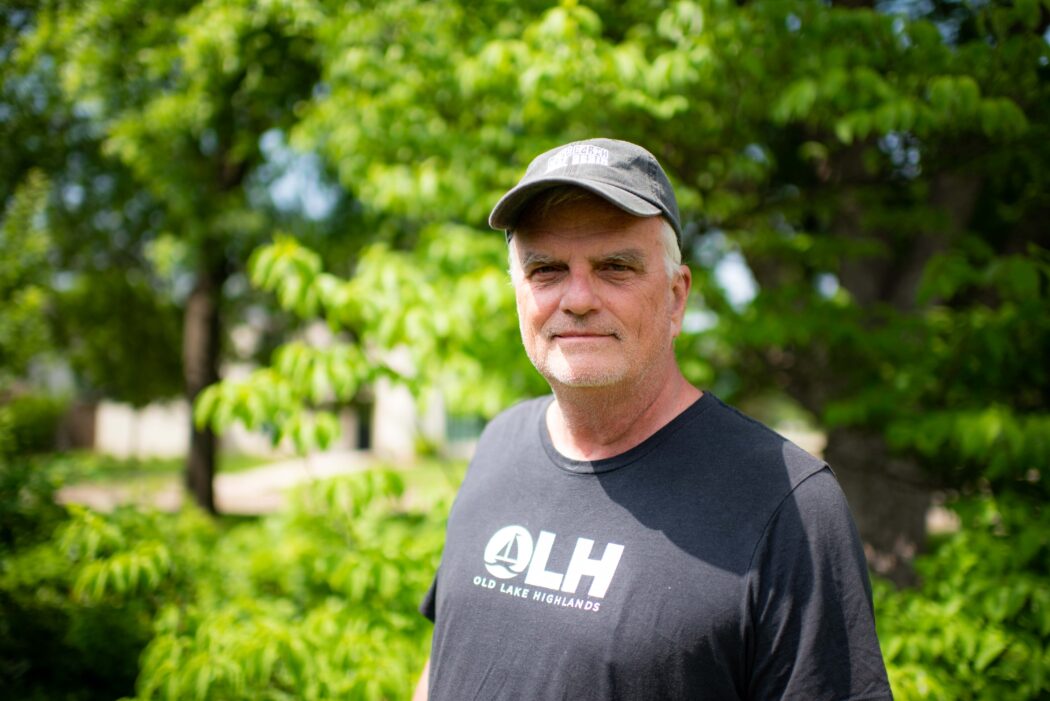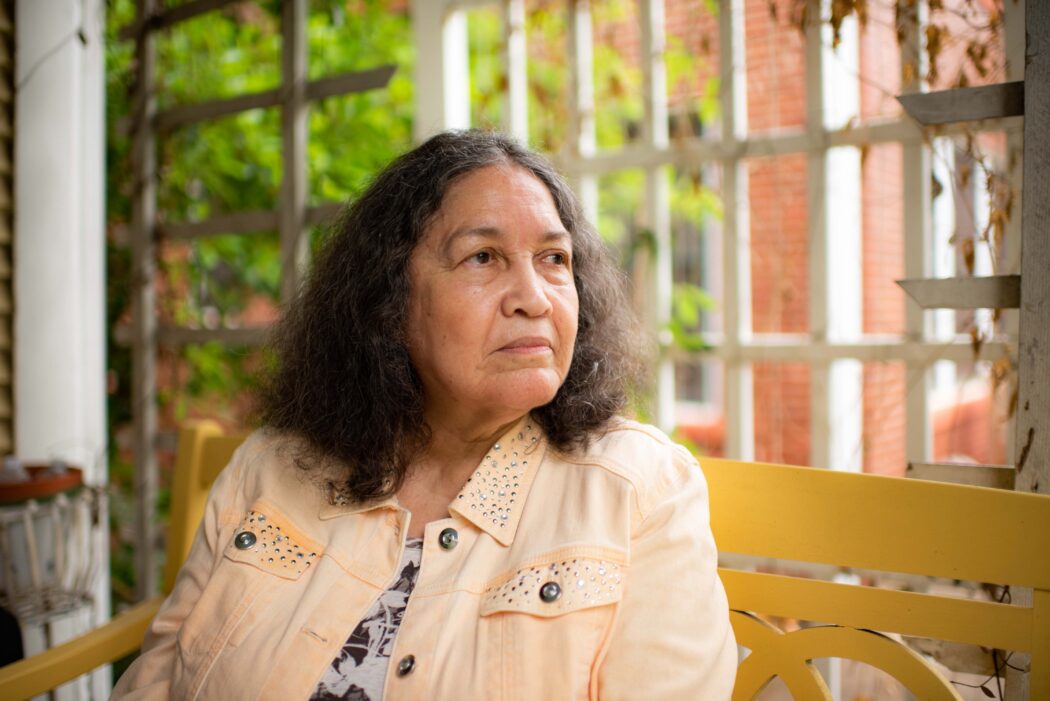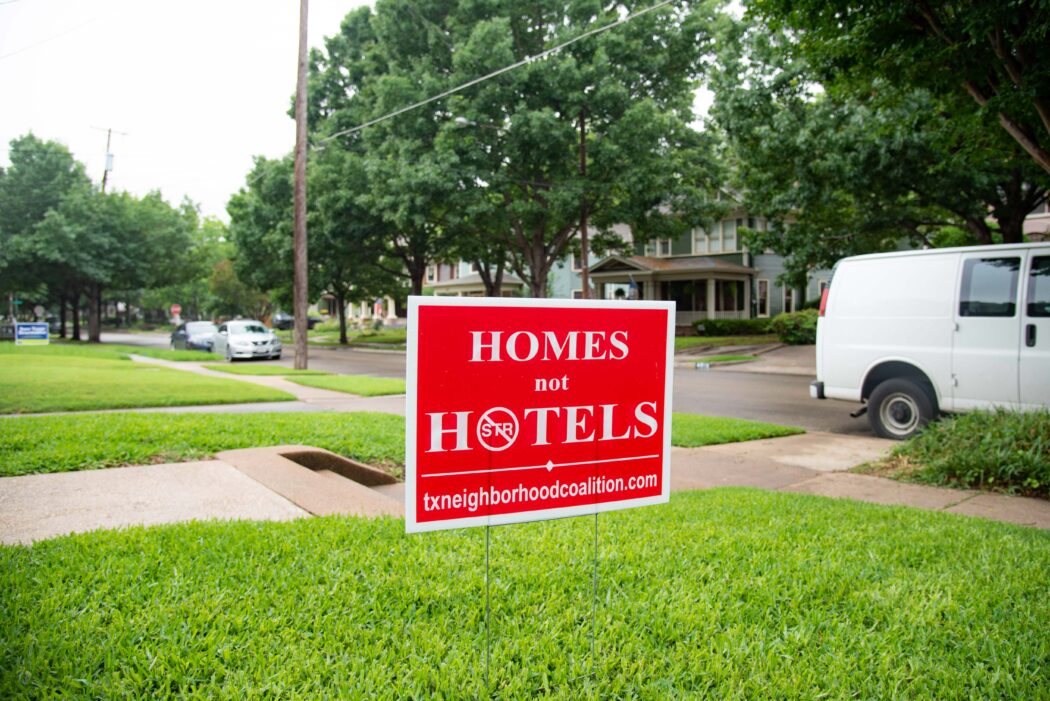
A view of the space at the short-term rental owned by Jeff Veazey. Photo by Emil T. Lippe.
Jeff Veazey and Dolores Serroka have lived in their respective neighborhoods for decades, each wanting their communities to remain quiet and peaceful. They are civically engaged and have spent years advocating for good housing practices.
But they represent opposing sides of a debate that has plagued the Dallas government for years and divided the city’s residents.
It’s the debate over short-term rentals.
Veazey, a former housing attorney, and his wife own a STR, a garage apartment in the back of their property in Old Lake Highlands; they say it helps them pay their property taxes. Serroka, who worked in the hotel industry for 35 years, lives in Peak’s Suburban Addition next door to a STR in fear that her property will be damaged or stolen by guests.
Task forces have been created and countless committee meetings scheduled to discuss how STRs — which are rented for no more than 30 days at a time — should be regulated and where they should be allowed. District 14 City Council member Paul Ridley made preserving single-family neighborhoods a campaign promise, and keeping STRs out of residential areas has become one of his priorities. Groups have formed against and in support of STRs, which include listings on platforms such as Airbnb and Vrbo. Members of the public, many of them wearing “Homes not Hotels” T-shirts, spent hours during an April city council meeting speaking about STRs. Yard signs bearing the same message are common throughout the city.
Yet the city council has not voted on zoning and registration ordinances, despite years of calls from residents to settle the issue. In the meantime, the thousands of STRs in Dallas continue to operate.
“They’re not doing anything to give us relief,” Serroka says.
FOR STRS

Jeff Veazey stands outside of his home in Dallas on Thursday, May 11, 2023. Photo by Emil T. Lippe.
Jeff Veazey and his wife didn’t originally set out to establish a short-term rental. Six years ago, they converted their garage into livable space to create room for their adult sons and partners when they came to visit.
They decided to use the garage apartment as a short-term rental to recover the cost of building it. Meanwhile, Veazey and his wife, a retired teacher at Hexter Elementary, continued to stay in the 1,500-square-foot main house, where they have lived for about 25 years.
Drawing from prior stays at Airbnbs across the country, the Veazeys did their best to become great owner/operators of their STR. Veazey says some neighbors didn’t even know that their STR existed because no complaints were made about it.
“My wife has worked so hard, and I have worked hard to try to keep what we got going here,” Veazey says. “But if we lost the short-term rental thing, I don’t know. I guess we’d have to get full-time jobs again or something.”
Lisa Sievers has a similar story. She and her husband were converting their pool cabana into living space for her parents, and the construction wasn’t cheap. Two days after listing the property on Airbnb, they had their first booking. A couple of years later, they purchased a property next door and made the garage apartment a STR.
Her husband, a retired teacher, manages the listings, which help generate money they use to pay property taxes.
Veazey and Sievers are also similar in that they have participated in the city’s efforts to regulate housing.
About a year ago, Veazey started polling his neighbors about STRs and has been speaking at city meetings. In the late 1990s, he served on a multifamily inspection task force that developed a program that led to an ordinance still in effect. Sievers, who’s on the board of the Dallas Short-Term Rental Alliance, has been on STR task forces for the past three years. She and Veazey agree that regulation is welcome, but a ban on STRs by zoning isn’t.
“It’s been bumpy,” Sievers says. “I think there’s a very vocal, small amount of people who are firmly against short-term rentals.”
AGAINST STRS

Dolores Serroka at her home in Dallas on Thursday, May 11, 2023. Photo by Emil T. Lippe.
Some residents who have spoken up at city meetings have shared horror stories about STRs in their neighborhood.
Timothy Sigler has lived in Lakewood for more than a decade. There’s a short-term rental in a duplex across the street. He saw people start coming in around March 2020.
“It was Friday, Saturday, and there would just be a ton of people, when all the bars were closed, when everything else was closed,” he says. “They were using STRs to run party houses so they could hang out with their friends.”
Once, Sigler asked some people who looked to be in their early 20s to stop using the swing set in Sigler’s front yard. His son was standing there, but the people trespassing told him to “F you,” that they could do what they wanted. He’s also seen people making videos in his front yard, his house in the background.
The problem now, Sigler says, is that there are people coming in and out every weekend.
“None of us let our kids play in the front yard anymore,” he says. “I have three swings out there that no one gets to use when I know someone’s come in, and they’re using the unit.”
For Serroka, who moved to the area now known as Peak’s Suburban Addition from Washington, D.C., in 1976, the effects of STRs are different.
She knows of three STRs on her block, including one next door. She once owned that property but decided to sell it instead of taking on a major repair project. Serroka turned down offers from developers, but the buyer ended up converting the property into a STR, after telling Serroke that he wouldn’t.

A sign against short-term rentals stands outside of the home of Dolores Serroka. Photo by Emil T. Lippe.
Since then, she says items have been taken from her yard, and the gas meter and sprinklers have been hit. And she’s heard loud music.
“I’m fighting really hard to keep neighbors in my neighborhood, not transients, people that just come and go,” Serroka says. “They’re guests for a couple of nights. They leave. They don’t care about the neighborhood.”
Jean McAulay, the president of the Lower Greenville Neighborhood Association, echoes Serroka’s sentiment and says, based on an informal survey of neighbors, most people don’t want to live next door to a STR.
“We want to be part of an ongoing group of people who live where they’re committed to raising their children and being part of a local community and volunteering and all that kind of thing that doesn’t happen if your next-door neighbor is someone different every day or every week who’s renting while they’re passing through town,” she says.
After years of playing hot potato with STRs, a two-part solution has been presented to the city council.
The first part involves regulations. For example, STRs would have to pay hotel occupancy taxes and register with the city. They would have to provide off-street parking and emergency contact information. City Departments such as Code Compliance would help enforce processes to renew and revoke STR licenses.
The second part of the solution involves zoning. The ordinance would classify STRs as a lodging use and prohibit them from operating in residential neighborhoods. About 95% of STR properties that are paying the hotel occupancy tax are within residential areas and would be unable to operate if the ordinance is approved. That means the party houses would be gone, and so would the STRs run by the Veazeys and Sievers of Dallas.
These two pieces were supported by the plan commission with a 9-4 vote in December. The city council has been briefed and received public comments on the issue, but a date hasn’t been set for a vote.
At the April 4 briefing, council members were split on STRs. District 14 City Council member Paul Ridley said he supports the regulations and zoning ordinance. But others, such as District 9 City Council member Paula Blackmon, still have questions. They are searching for a compromise that would preserve quality of life in neighborhoods, root out “bad actors” and allow individuals like Veazey and Sievers who rely on STRs for revenue to continue doing so. The council members asked whether certain multifamily properties could be exempt from the ban.
Regardless of the council’s decision, there are other issues. Dallas police have been primarily responsible for responding to noise complaints, violence and other issues stemming from STRs and all other properties after hours. But the department is already understaffed, and even with additional Code Compliance officers, police officers would still be called to certain situations, meaning the regulations would be difficult to enforce.
There’s also a chance that if the city decides to approve the zoning and regulation, the ordinance could be challenged with legislation from Austin. House Bill 2665 would create a task force to investigate municipal ordinances regarding STR regulation and report back to the state, including by recommending legislative policies about statewide regulation of STRs.
But until there’s a vote, we stick to the status quo. The debate over short-term rentals continues.





